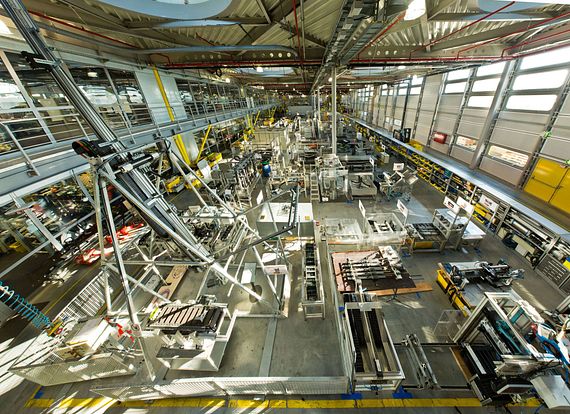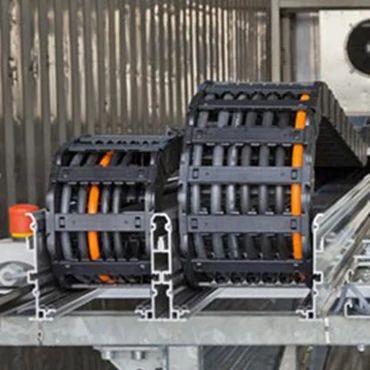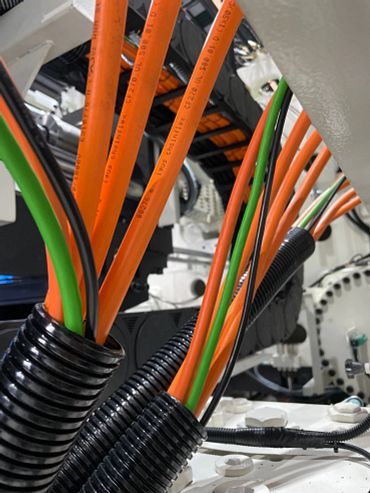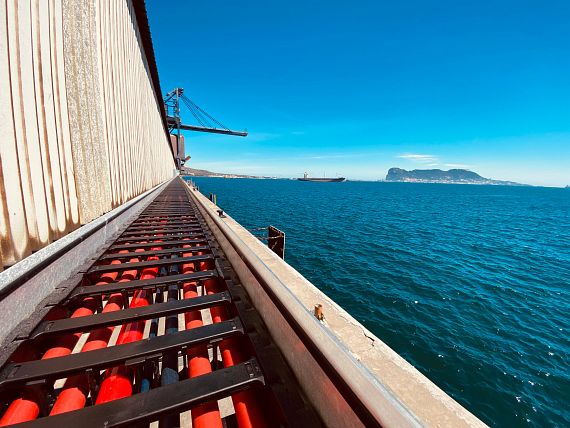Cold-resistant and heat-resistant cables
Heat-resistant cables are specifically designed for use in extreme temperatures, such as cold-resistant cables and heat-resistant cables.Temperature-resistant cables are preferred for applications that must continue to operate in very hot or very cold ambient temperatures. For example, low temperature cables are often used in refrigeration or in the offshore industry, while high temperature cables are commonly found in metallurgical, steel, and rolling mill applications or in cement, glass and ceramic processing. In both extreme temperautre conditions, the function and reliability of the cables must be guaranteed as it would in normal ambient temperatures. Depending on the application, seasonal variations in temperature also affect the outer jacket material of the cables used outdoors. In the case of permanently moving cables, the mechanical stress in addition to the adverse environmental influences affects the service life of the cables. igus® was the first to develop complete e-chain® systems consisting of chainflex® cables and energy chains from one source for adverse conditions in the high and low temperature ranges.
Would you like more information about chainflex® cables? Our experts will be happy to get in touch with you
Information on cold and hot-resistant cables

Categories of temperature resistance cables
- igus® test in e-chains®- In this test, the cable is fitted taking into account the bend radius, the interior separation and the strain relief elements. After assembly, the cable is moved according to the igus® test standard values. The movement takes place in the climatic container at temperatures down to -40°C. The test is deemed to have been passed if the construction is removed from the e-chain intact (especially without jacket damage).
- Flexible: test according to DIN EN 60911-504 for "moved". The cable is cooled down to test temperature. After the cable has been subjected to the test temperature for more than 16 hours, it is wrapped around a mandrel. After the removal, a pure visual inspection is carried out. This so-called winding mandrel test is considered to be passed if the jacket of the cable remains undamaged.
- Fixed: test according to DIN EN 50305 for "fixed installation". The cable is held in place at test temperature and a test weight is dropped onto it. This so-called cold impact test is regarded passed if the cable jacket remains undamaged.

Cold-resistant and heat-resistant cables
Tested in the laboratory
In the igus® test laboratory, all chainflex® cables are subjected to a very complex series of tests. In addition to the 2,750 m² test laboratory, igus® has set up a specially designed large climate container in which cable tests are carried out in continuous motion at -40 degrees Celsius.
All cable manufacturers specify two temperature ranges in their catalogues in which their cables can be safely used: one for fixed installation and the other for moving applications. In fact, reference to a binding standard is intended to create comparability, but what is meant by the term "movement" in standard tests has little to do with the actual movement in an energy chain, particularly in terms of the respective fill weights.
In addition to the tests according to DIN specifications, at igus® we have retroactively qualified all the offered chainflex® jacket mateirals with a very wide range of cables. This is done through practical tests under real-world conditions in the igus® climatic containers. After testing for nearly 400 million strokes, we are able to designate ourselves as the only supplier of three defined categories: "fixed installation according to DIN", "moving application according to DIN" and "e-chain® according to igus® test series under real conditions". On the one hand, this information creates security for our customer and strengthens our guarantee. We are able to make guaranteed service life statements on the basis of these real-life test methods. The same principle also applies to the selection of the correct bend radius.

Heat-resistant cable for minimal maintenance and high functional reliability
Wherever high-intensity production is required, a heat-resistant cable provides reliability. It is designed for extreme conditions and ensures both heat resistance and flexibility are availableigus® offers advanced polymer products for professional use and during the development, special emphasis is on ensuring that all products and systems are coordinated. A reliable operation even under high load and a long service life are prerequisites for developments and innovations to turn into volume production. To enable a heat-resistant cable to be fully operational for a long period, igus® produces it using the chainflex® process. The material absorbs the heat expansion and contraction when the temperatures drop, and fatigue is prevented by the high elasticity. This high-quality jacket structure is complemented by the interior of the cable, because core, stranded wires and stranding are also optimised for movement.
These valuable performance features make igus® heat-resistant cables a favourite in places where constant inspection and maintenance is difficult and expensive. The fields of application include the steel industry and plastics processing, but also the sauna industry. The heat-resistant cables from igus® are ideal partners for, among others, the igus® tribo-filament, which can withstand temperatures of up to 180°C. Each cable can only be as good as accessories and supplementary parts allow it. That's why plug-in connectors are available, guide trough modular kits or strain relief systems for a complete application solution.
